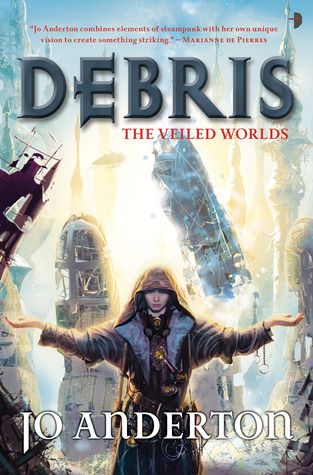Tanyana is a talented and celebrated architect. She’s one of the elite, someone who can control “pions,” allowing her to manipulate matter with a thought. She’s high up in the air, working on a towering statue, shaping the raw matter around her into art, when suddenly she finds herself under attack by strange, uncontrollable pions. When she regains consciousness after a horrible fall, it becomes clear that she has suffered more than just physical injuries: she’s lost the ability to see pions and can now only see “debris,” a sludgy byproduct of pion manipulation.
In an instant, Tanyana’s charmed life comes to a grinding halt. While unconscious and recovering from her injuries, a tribunal has already found her guilty of negligence. Against her will, she is fitted with a strange powersuit and assigned to a team of debris collectors. Before long, the once-proud architect finds herself reduced to poverty, trudging through the poorest parts of the city with her team to gather the filthy debris in a constant race to make quota. Gradually, she learns more about the true nature of her suit, the history of pions and debris, and the true cause of her fall.
Debris, by Jo Anderton, took me by surprise for a number of reasons, but mainly because its setting is so captivating and unique. The novel is set in Movoc-under-Keeper, the capital of Varsnia. There’s a vaguely Slavic tone to many of the names and terms, and the ruling “veche” seem to be a parallel of the Russian Soviet in their heyday: a powerful, secretive elite with an impenetrable bureaucracy that’s in almost complete control of society, helped by mechanical puppet men. Two hundred years ago, the “pion revolution” turned this pre-electricity society that mainly seemed to run on steam and gas into a new world where matter can be manipulated with a thought. Whether this process is magic or an extremely advanced technology is never fully explained, so I’m still not sure whether to call Debris fantasy or science fiction. Maybe something like “post-steampunk” wouldn’t be a bad term because of the way pions transformed the technological side of this culture and the way the book handles themes of social and economic inequality. The setup reminded me a bit of Ian MacLeod’s wonderful The Light Ages and The House of Storms, although Debris has a much more far-future SF feel to it.
Jo Anderton populates her debut with a set of interesting characters. The book is told from the first person perspective of Tanyana, and the fact that she’s not exactly a likable person could be one of the main reasons why some people will have trouble with this novel: she has fallen from a great height and never really lets the reader forget that she’s pissed off about this. She’s simply not happy to be so exposed to the way the poor in her city live their lives, and occasionally comes across as both whiny and arrogant at the same time. However, she also shows enough pluck to make the best of her drastically changed situation and figure out what caused her “accident,” which adds a pleasant mystery aspect to the novel. Debris also features several surprisingly rounded side-characters. Jo Anderton is one of those authors who has the ability to shape a character with a few deft lines, even when introducing a group of them at once, such as the people in Tanyana’s debris-collecting team. Debris shows a large variety of characters, rich and poor, powerful and down-trodden, and most of them take on enough substance to feel like more than just bit players.
Debris, as the first book in the Veiled World series, also goes a long way towards establishing a fascinating fictional universe.The city of Movoc-under-Keeper itself has a solid, realistic atmosphere. Like China Miéville’s New Crobuzon, it’s one of those fictional cities that ends up feeling like you’ve actually lived there for a while by the time you turn the book’s final page, because Anderton occasionally throws in great slice-of-life scenes like Tanyana’s challenging first commute to her new job. Debris also refers to at least one other country and hints at the possibility of war in the future. There are several tantalizing references to the world’s past, from the pion revolution to an underground movement that’s trying to protect scraps of its fading identity and knowledge. Add to that the fact that I’m still not entirely sure whether this is SF, fantasy, both, or neither, and you have a pretty interesting and unique setting that could expand in different directions and host some great stories in the future.
As with most debuts, some aspects of Debris are a bit rough around the edges. There’s a love story here that, at least for much of the novel, feels like it was grafted onto the overall plot in a way that didn’t completely make sense. Also, Jo Anderton sometimes skips over things you really want to read more about, and then focuses on others that seem less interesting, but of course all of this could end up making perfect sense by the time Suited, the next book in the Veiled Worlds series, is out. And finally, the ending surprised me, and not entirely in a good way.
Regardless, while it’s not perfect, Debris is a strong, exciting debut that took me by surprise with its unique setting, interesting main character, and powerful “fight your way back to the top” narrative. If you enjoy genre-bending fiction with a dark edge, definitely give Debris a try.
Stefan Raets reads and reviews science fiction and fantasy whenever he isn’t distracted by less important things like eating and sleeping. Many of his reviews can be found at Fantasy Literature.










